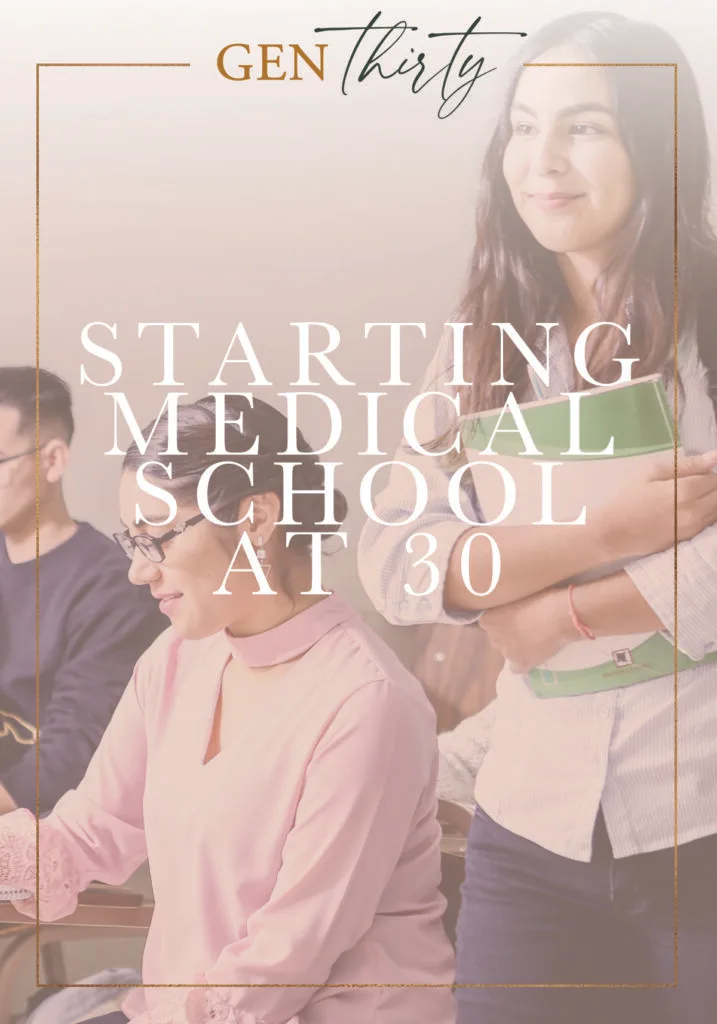Are you a thirty-something looking to make a major change in your life? Starting medical school later in life can be a challenging and intimidating decision.
Many factors come into play when considering if it is the right move, as well as understanding the pros and cons of embarking on this journey at an older age.
In this blog post we are going to look at the key considerations to take into account before taking this significant step toward becoming a doctor.
We will examine why starting medical school late might be beneficial, what challenges may arise, and how creating thoughtful preparation strategies can help ensure success throughout your pursuits.
Why Is Starting Medical School at 30 a Good Idea?
Medical school can be an intense and challenging experience, and for some people, it may be a better idea to start later in life.
There are a lot of reasons for this, as we will see below. Going to medical school is a large commitment – both in terms of time and money, so you’ll really want to weigh the options for yourself.

There are a number of benefits to starting medical school later in life.
First, you will have more life experience and may be better able to handle the stress of medical school.
Second, you will likely be more financially stable and able to afford the cost of medical school.
Third, you may be more mature and able to focus on your studies.
Finally, you will have more time to establish your career and family before going back to school.
Starting medical school later in life can be a great choice for some people, but it is not right for everyone.
If you’re interested in starting a medical career later in life, talk to someone you know personally in the medical profession (check with family members and friends) and see if you can ask them some specific questions.
If you are considering starting medical school later in life, be sure to weigh the pros and cons carefully and make the decision that is right for you.
What are some of the benefits of starting medical school later in life?
There are a few benefits to starting medical school later in life.
First, you have more life experience and therefore can bring more to the table in the classroom.
Older applicants and nontraditional students are likely not meeting medical education for the first time. You’ve seen more and you’ve done more. This is invaluable.
You’re also likely more mature, meaning you can handle the stresses of medical school better.
A mature student with life experience isn’t as stressed out by situations throughout their education and residency program. It’s like you’ve had a few gap years to gain life experience before choosing your path.
Additionally, you may be more established in your career and have a greater ability to financially support yourself during medical school.
Finally, you may be more likely to stay in medical school and complete your degree, since you’re not as young and may have other commitments that make dropping out less desirable.

What are some challenges of starting medical school at 30?
One of the biggest challenges that may be encountered when starting medical school later in life is the fact that you may be starting from scratch in comparison to your younger classmates.
This can mean that you are at a disadvantage when it comes to the amount of knowledge you have about the field, as well as the social and networking opportunities that come with attending medical school.
Additionally, many older students may have to contend with decreased stamina and energy levels, which can make it difficult to keep up with the demands of school. However, at age 30, you’re likely not dealing with this yet.
Students who start medical school later in life also have to balance work and family obligations, which can be a challenge in and of itself. You might also find yourself disappointed with the new lack of free time.
A career change might also be challenging to explain to admissions committees. To get into the best medical school in the medical field, you’ll need a bachelor’s degree and need to pass the correct exams to get in.
You might likely find it easier to write a personal statement, though. As an older student this is really a great way to connect to a medical school admission team as a medical school applicant.
However, with hard work and perseverance, it is definitely possible to overcome these challenges and succeed in medical school.
How can you prepare for a successful journey through medical school later in life?
There is no one-size-fits-all answer to the question of how to best prepare for medical school, as everyone’s journey through this process will be unique.
However, there are some general tips that can help make the experience smoother and more successful.
First and foremost, it is important to maintain a strong academic record. This is essential for gaining admission to a good medical school, and it will also be necessary to succeed once you are enrolled.
It is also important to develop a strong work ethic and to be able to manage your time effectively. As a medical student, you will have a lot of work to do, and it is important to be able to stay on top of it all.
Another key element of success in medical school is maintaining good relationships with your professors and classmates.
These relationships will help you get the most out of your education, and they can also be helpful when it comes time to apply for residency programs.
Finally, it is important to stay healthy both mentally and physically. Medical school can be stressful, so it is important to take time for yourself and to make sure that you are eating well and getting enough exercise.
If you follow these tips, you should be well prepared for a successful journey through medical school later in life.
Planning your education for medical school:
When planning for medical school, it is important to make a plan in advance to ensure that you can get the most out of your education, especially as nontraditional applicants.
First, research different medical schools and find one that best meets your goals.
Consider factors such as academic rigor, cost of attendance, location, campus size, specializations offered, and the school’s reputation.
It is also important to figure out how you will finance your education. Consider applying for scholarships, grants, and student loans as well as finding side jobs or taking on other forms of part-time work.
Additionally, make sure to plan ahead for the MCAT exam (and see how your mcat scores compare) and any other entrance exams you’ll need to take on your journey to medical school.
Finally, it is important to begin preparing for your application as soon as possible. This includes taking the time to write a strong personal statement and gathering letters of recommendation from individuals who can speak positively about your skills and qualifications.
Overall, following these steps will help ensure that you are prepared for success in medical school.

How can you prepare financially for medical school in your 30s?
It can be difficult to prepare financially for medical school in your 30s. However, there are a few steps that you can take to make the process a little bit easier.
You should also consider what to do with your current student loans if you have them. If you want to see if med school is a good fit you, commit to at least one semester and see if it is something you want to pursue.
One thing that you can do is start saving as much money as possible. Med school is expensive and you’ll be spending a lot of time on your medical training so you likely won’t be able to work throughout your medical school journey to becoming a licensed physician.
This may mean cutting back on your spending, or finding ways to make extra money. You may also want to consider taking out a loan to help cover the costs of medical school. This is definitely something to consider if you have financial obligations, like a mortgage.
You also need to consider what your health care will be while you’re in med school. If you need to commit to years of training to have a successful career in medicine, you’ll want a solid financial plan for not only covering your expenses but your income in future years.
Another thing that you can do is research different scholarships and grants that are available to medical students. There are a number of different scholarships and grants available, and many of them are specifically designed for students who are over the age of 30.
Finally, you should talk to your family and friends about your plans to go to medical school. They may be able to help you out financially, or they may be able to provide some moral support along the way.
Overall, it is definitely possible to prepare financially for medical school in your 30s. By taking the right steps, you can make the process a little bit easier on yourself.
How will you relate to your peers as an older medical student?
As an older medical student, it can be intimidating to enter a primarily younger classroom. However, you should try not to let age stop you from engaging and making connections with your peers.
The good news is that medical knowledge does not have an age limit. You can have medical knowledge at any age. Older med students come from all backgrounds, career paths, work experience, etc – you should not be intimidated.
First, remember that everyone is in the same boat as far as their educational journey goes – regardless of age. As long as you are willing to put in the effort to study and do well, your age should not be a factor.
Second, look for common ground with your classmates. You may find that you have similar interests, goals, or even experiences that will help create a bond between you and your peers.
Third, get to know some of your classmates outside of the classroom. This could include studying together, grabbing a bite to eat, or just hanging out and getting to know one another.
Finally, be open-minded when conversing with your peers. Listen to them and show respect for their opinions even if they differ from yours.
Overall, by following these steps you will be able to relate to your peers as an older medical student. With some effort and positivity, you can become a valuable member of the class.

In Summary: Should You Start Medical School at Age 30?
Despite the challenges that may come with starting medical school later in life, it can still be a rewarding and successful experience.
If you are considering starting medical school later in life, there are some things you can do to set yourself up for success.
More Posts About Life In Your 30s
- Best 225+ Turning 30 Phrases, Wishes, Messages for a 30th Birthday
- 10 Things To Look Forward To In Your 30s
- 10 Best Blogs To Read In Your 30s
- 30 Books to Read In Your 30s
- 50 Inspiring Quotes For Your 30s
- The Ultimate Bucket List For Your 30s
- Turning 30 Poems: 30 Poems For 30th Birthday Wishes
- Turning 30 Humor and Turning 30 Jokes That Will Make You Laugh
- Cheers to 30 Years: How I’m Approaching My Thirties
- How To Deal With Overbearing Parents at 30
- 30th Birthday Party Themes: 36 Ideas To Celebrate in Style
- Gifts For Women In Their 30s
- How To Get My Life Together At 30
- How To Reinvent Yourself At 30
- 50 Movies Every Woman Should Watch In Her 30s
- 200+ Smile Quotes for Instagram to Inspire You
- 30 Great Gifts For Someone Turning 30
- How To Dress In Your 30s: 21 Must-Have Style Pieces
- Being In Your 30s: Everything You Need To Know
- 40 Hairstyles For Women In Their 30s
- Being Broke at 30: What To Do About It
- Starting Over In Your 30s: Where To Go From Here

Best Backpack for Medical School [Top 17 - 2022] - GenTwenty
Tuesday 3rd of January 2023
[…] you’re headed to medical school, congratulations! This is a huge step in your education and career journey. Now that you’ve […]